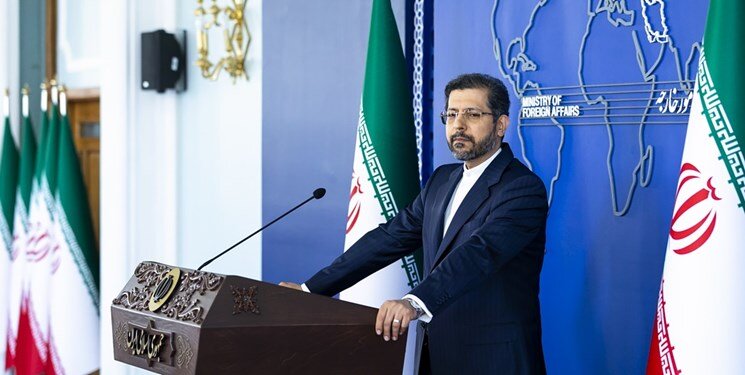Foreign Ministry says no direct talks between Iran and U.S. in Vienna

TEHRAN — Iranian Foreign Ministry Spokesman Saeed Khatibzadeh on Monday rebuffed claims by U.S. National Security Advisor Jake Sullivan that Washington had given Iran a direct message on Tehran’s nuclear program, saying no direct messages or talks have been exchanged between Iran and the United States.
There have been no direct talks between Tehran and Washington since the start of the talks in Vienna in April, Khatibzadeh said.
“Regarding the Vienna talks, no direct talks have taken place with the United States in the recent months,” Khatibzadeh told a weekly press briefing.
However, the spokesman further clarified that any messages concerning the negotiation have been delivered to Iran through European Union deputy foreign policy chief Enrique Mora.
“Some messages on the issues of negotiation have been received [by Iran] in a written and unwritten form through Enrique Mora since the start of the talks in Vienna, and answers have been given on the spot,” the diplomat reiterated.
Two agreed-upon texts on the table
In response to a question about the agreed-upon texts in Vienna, Khatibzadeh clarified that there are two texts, on which Iran and the P4+1 (Russia, China, France, UK, and Germany) have agreed.
“These texts have incorporated Iran’s views in addition to the previous texts … We now have texts according to which we can continue the future talks,” he underscored.
The spokesman complained that if the other parties had begun the latest round of talks with the same attitude that they concluded the round, “we could have reached these texts sooner.”
We are pessimistic of U.S. intentions in Vienna
Later in the briefing, when asked whether he is optimistic of the talks in Vienna, he said, “We do not engage in psychological operations to declare optimism or pessimism.
Some of these announcements are part of a psychological operation. It is quite clear that in the framework designed by some American and European parties, some smear campaigns or sudden expressions of optimism occur to impact the negotiation room.”
He added that during the talks, the Iranian delegation always thinks about the outcome.
“We pursue the talks with determination and optimism, but we are not optimistic about the intentions of the other side, the United States," the spokesman said.
According to Iran, He added, the right path is to avoid early judgment and put all the energy into reaching a conclusion.
“In the 12th and 13th days of our seventh round of talks, despite the fact that the other side made public campaigns against the talks, we focused all our energy on shaping that text into the basis of the negotiations in the eighth round,” he declared.
Khatibzadeh added that Iran is entering into the Vienna talks with the hope that if the other side enters with the will to lift the sanctions effectively and in a verifiable manner, a result can be reached in the “shortest possible time.”
The latest round of talks in Vienna to lift the sanctions imposed on Iran ended on December 17 with the meeting of the Joint Commission of the JCPOA attended by Iran and the P4+1 group of countries.
The sides agreed to return to their capitals to consult with higher officials.
After Friday’s meeting of the JCPOA Joint Commission, EU coordinator Enrique Mora spoke to the press saying that participants have reached a joint text for negotiations.
Mora added that this draft is comprehensive and includes the views and proposals of the P4+1 and the Iranian delegation on various issues, including the lifting of sanctions and the sequencing arrangements.
Meanwhile, Iran’s top negotiator Ali Bagheri Kani told IRNA that during the latest round “serious negotiations took place,” and finally the Europeans accepted Iran’s stance as a basis for “effective negotiations.”
He added that the Europeans did not offer any initiatives.
“They have previously stated that we have suggestions and initiatives on some issues, but during this period of discussions we did not receive any suggestions or initiatives from them,” Bagheri Kani said.
The developments come as Iranian Foreign Minister Hossein Amir Abdollahian announced on Wednesday that the Islamic Republic had reached a “good deal” with the International Atomic Energy Agency (IAEA) that will allay Western concerns about Iran’s nuclear energy program.
According to the agreement, the IAEA will be allowed to replace security cameras at the TESA Karaj centrifuge component manufacturing workshop, which were damaged following a sabotage attack on the complex in June of this year.
Leave a Comment